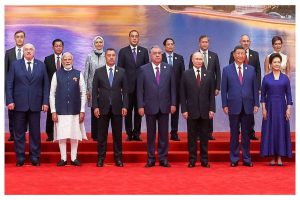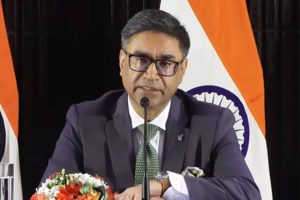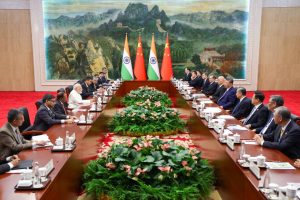The Shanghai Cooperation Organisation (SCO) Summit 2025, opening in Tianjin on Sunday, will seek to chart a course for deeper unity, enhanced regional security, and stronger financial mechanisms, with leaders also aiming to amplify the collective voice of the Global South, China Daily reported.
More than 20 foreign leaders and 10 heads of international organisations are expected to attend the two-day summit. Chinese President Xi Jinping will chair the 25th Meeting of the Council of Heads of State as well as the “SCO Plus” session, where he will deliver keynote speeches.
This is the fifth time China is hosting the SCO summit, and it is set to be the largest gathering since the organisation’s inception. Chinese Foreign Minister Wang Yi, writing in People’s Daily on Saturday, said the SCO had organised 110 major events under China’s presidency since July last year, highlighting Beijing’s role in advancing the “Shanghai Spirit.”
Wang expressed confidence that the summit would mark “a great event of friendship, solidarity and fruitful outcomes,” with China aiming to push the organisation into a new phase of “high-quality development” marked by greater cooperation and productivity.
According to China Daily, leaders will sign a joint declaration, adopt a 10-year SCO development strategy, and issue statements commemorating the 80th anniversaries of both World War II’s victory and the founding of the United Nations. Several outcome documents are also expected, covering security, economic growth, and cultural exchanges.
Key items on the agenda include the creation of financial support mechanisms, notably the establishment of an SCO Development Bank, Chinese Ambassador to Russia Zhang Hanhui told Russia Today earlier this month.
Sun Zhuangzhi, director of the Institute of Russian, Eastern European and Central Asian Studies at the Chinese Academy of Social Sciences, noted that the SCO has become a platform engaging diverse participants and market players. “The organisation embodies the future trajectory of economic growth and technological innovation,” he said.
The SCO currently has 10 members—India, China, Russia, Pakistan, Kazakhstan, Kyrgyzstan, Tajikistan, Uzbekistan, Iran, and Belarus—along with several observers and dialogue partners.





